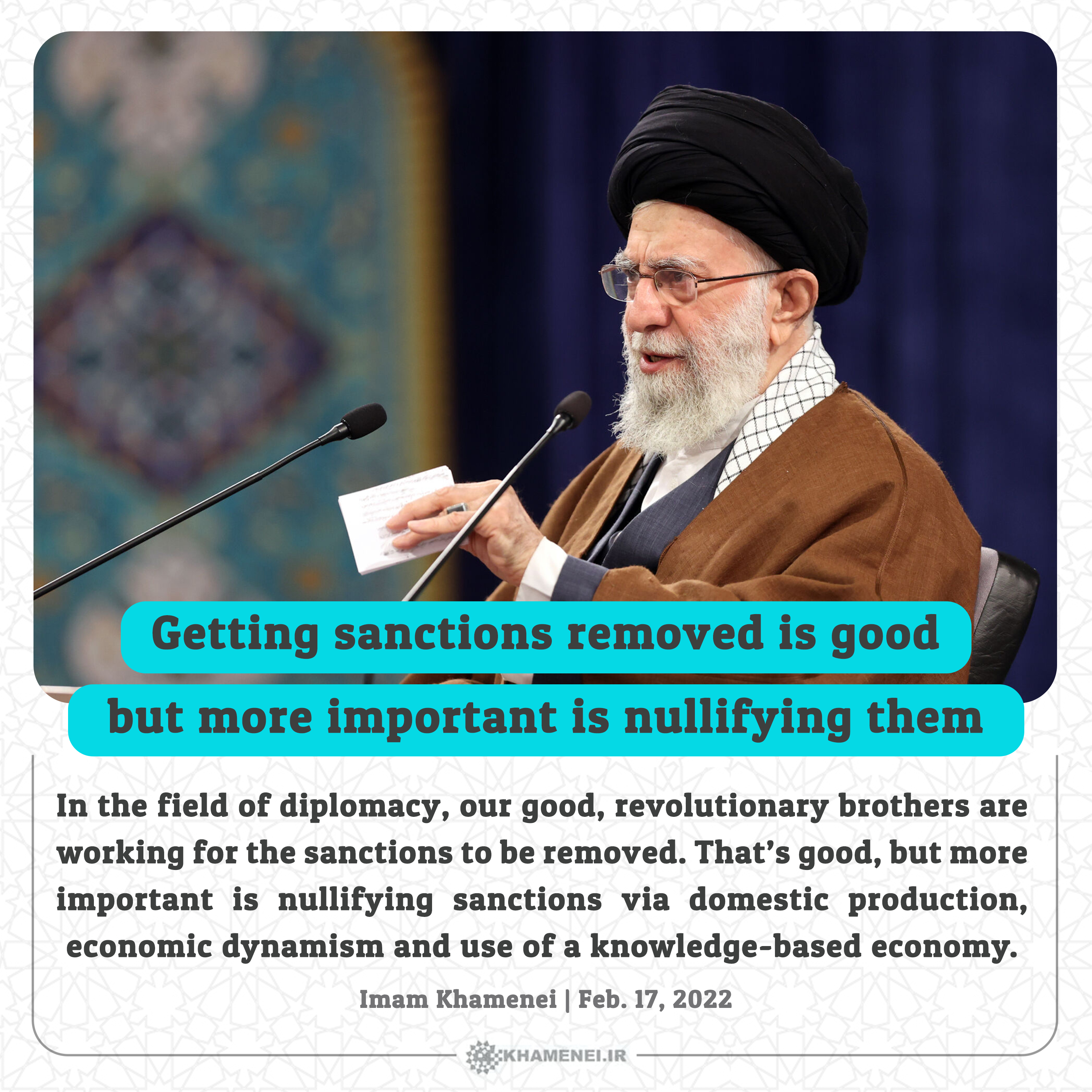Supreme Leader Ayatollah Ali Khamenei welcomed efforts by Iranian diplomats to get U.S. sanctions lifted as part of talks on restoring the 2015 nuclear deal. Negotiators are “working to lift the sanctions and persuade the other side, which is good,” he said on February 17 in a speech marking the anniversary of an uprising against the monarchy in 1978.
But Khamenei, while providing political cover to the diplomatic effort, also implicitly warned negotiators to be more vigilant than their predecessors who brokered the original deal. He recalled that some of his critiques about the agreement and its implementation were not heeded in 2015-2016. “Well, some of those points did not receive attention and therefore, the subsequent problems that everyone is aware of arose. So, looking to the future and being prepared for it is important.”
 Khamenei downplayed the importance of sanctions relief. The “main task is to neutralize the sanctions by creating a movement of domestic production and domestic economic mobilization,” he said. For years, Khamenei has promoted the “resistance economy” model, which centers on self-sufficiency. He has long contended that Iran’s economy is strong enough to weather U.S. sanctions.
Khamenei downplayed the importance of sanctions relief. The “main task is to neutralize the sanctions by creating a movement of domestic production and domestic economic mobilization,” he said. For years, Khamenei has promoted the “resistance economy” model, which centers on self-sufficiency. He has long contended that Iran’s economy is strong enough to weather U.S. sanctions.
In his speech, the Supreme Leader also claimed that an “enemy front,” including the United States, was trying to undermine Iran’s capacity to produce nuclear energy for electric power. “They impose sanctions while they know that our nuclear energy project is peaceful.” The enemies “do not want the Iranian nation to achieve this great and significant scientific progress, and they are putting pressure on us because the nation will need it tomorrow.”
Khamenei reiterated that Iran does not seek nuclear weapons. “They say that Iran is such and such an amount of time away from producing a nuclear bomb. These are nonsensical and meaningless remarks.” Iran, however, conducted nuclear weapons related work until 2003, according to U.S. intelligence. In December 2021, CIA Director William Burns said that the spy agency “doesn’t see any evidence that Iran’s Supreme Leader has made a decision to move to weaponize.” The following are excerpts from Khamenei’s speech.
Supreme Leader Ayatollah Ali Khamenei
“We too will need peaceful nuclear energy sooner or later. Today, if we do not think about it, if we do not follow the matter, it will be late tomorrow and our hands will be empty. When the world dominates all aspects of this issue, it will be difficult for us to move forward that day. So, you see how cruelly the enemy front is focusing on the issue of our nuclear energy!
“They impose sanctions while they know that our nuclear energy project is peaceful. They say that Iran is such and such an amount of time away from producing a nuclear bomb. These are nonsensical and meaningless remarks. They themselves know that we are not looking for nuclear weapons and that we are only looking for the peaceful use of nuclear energy. They understand and know this. They do not want the Iranian nation to achieve this great and significant scientific progress and they are putting pressure on us because the nation will need it tomorrow and they do not want this movement to continue.
“If we fail to address these future and long-term issues today, we will face problems tomorrow. In the case of the JCPOA, in 2015, 2016, my objection was that certain points had to be observed so that no further problems would arise. My objection was mainly to this. I said to officials that they had to consider certain points and I frequently mentioned them in my recommendations. Well, some of those points did not receive attention and therefore, the subsequent problems that everyone is aware of arose. So, looking to the future and being prepared for it is important.”
“The economic pressure must be neutralized by internal efforts, the neutralization of the sanctions and, of course, by diplomatic efforts. Our good brothers are busy working. Our revolutionary brothers are also working to lift the sanctions and persuade the other side, which is good. But the main task is to neutralize the sanctions by creating a movement of domestic production and domestic economic mobilization. Knowledge-based companies are very important. The move to establish a knowledge-based economy and knowledge-based companies is really important, but this must be developed and expanded.”
